For the past nine years, I’ve been working to end youth and young adult homelessness in different capacities. I’ve worked in advocacy, direct services and creating partnerships. From all these experiences, I’ve learned that to transform systems, we need to listen and bring people together.

I started my work in this field at The Mockingbird Society, where I started to see how system-level change requires multiple parties to push for reform. It became apparent that everyone who interacts with the system is part of the solution – from young people to legislators to funders to social services staff. In my six-and-a-half years at Mockingbird, I had the opportunity to interact with people in all these roles and help rally them around our mission.
When I moved into a direct service role at the Accelerator YMCA, I saw firsthand how young people’s insights and expertise can help shape effective programs. My job was to connect young adults ages 18-24 with flexible diversion funds that could support their housing needs and keep them from experiencing homelessness. We held focus groups with young people to gather their feedback on the program, leading to adjustments to make the program more effective at meeting their needs.
Right before joining the A Way Home Washington team, I worked at YouthCare, where I helped connect service providers throughout King County with the juvenile court system. Working closely with the system, I gained perspective into how partnerships between systems and service providers can help ensure better outcomes for young people.
During these nine years, I’ve heard organizations speak about changing the system countless times. And I agree – we do need change! But my mental picture of the system has changed over the years. It’s transformed from a monolithic, singular entity in my mind to a composite of the multiple individuals that comprise the system. And this shift has made the prospect of changing the system less intimidating – it’s not about moving one giant colossus, but rather about unifying the individuals that make up the system to work together.
Changing the system means unifying legislators around policy that will result in better outcomes for young people. Listening to young people and making changes so they can navigate services more easily. Making investments so that service providers can more easily do their work and support young people. And it means constantly asking ourselves who is missing from the table.
As Community Engagement Coordinator, my work will center on building a table that prioritizes those most impacted by youth and young adult homelessness. That means communities of color. The LGBTQ+ community. Young people with lived experience and alumni. Everyone at A Way Home Washington is accountable for ensuring that these voices always guide our work, and through this position we have the added capacity to work on these relationships intentionally and continuously.
To ensure that our work leads to everlasting and equitable change, we’re going to need the perspective of all parties involved in systems that serve young people. We’ll need to think critically about who needs to be included in these conversations and processes. This is one of the reasons I’m excited to be part of the A Way Home Washington team. If we’re going to do this right, then everyone involved needs to have a voice in this process.

Leave a Reply